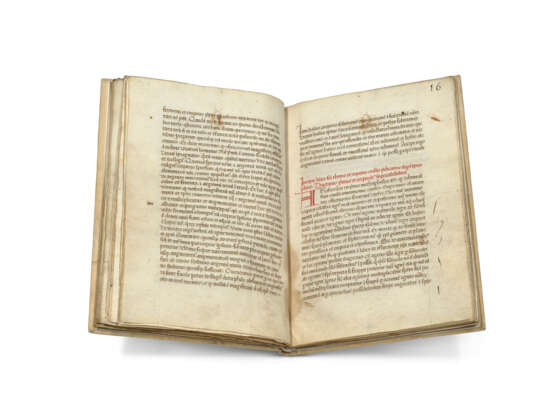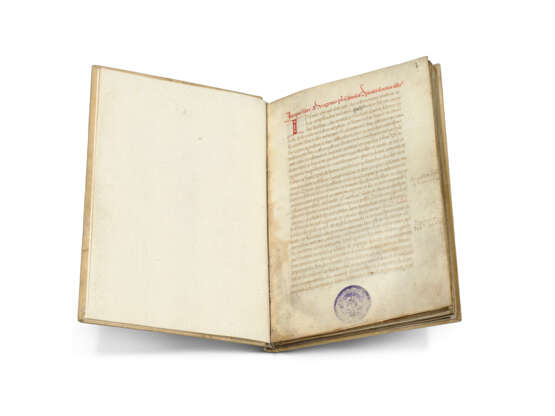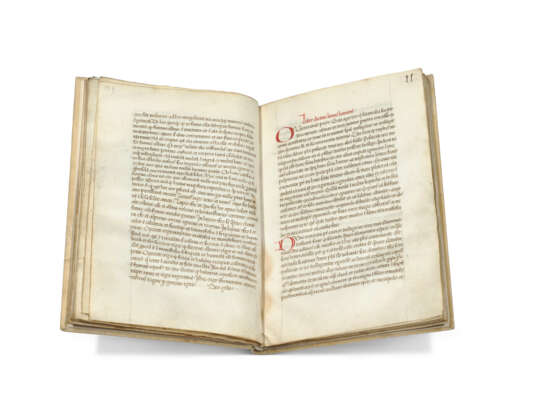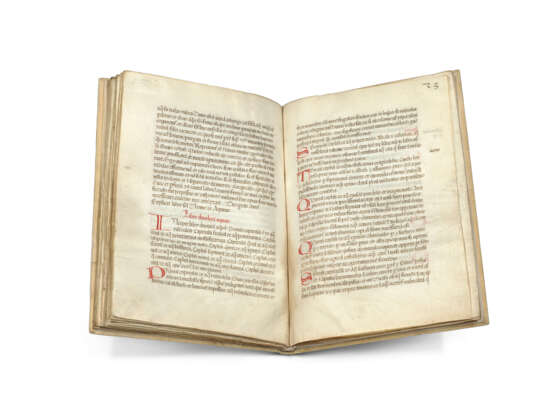ID 1349761
Lot 6 | Morigenes the Astrologer, Pseudo-Aristotle, Geber and others
Estimate value
£ 12 000 – 18 000
A compendium of alchemical texts, in Latin, manuscript on vellum [Italy, c.1400]
A handsome - and early - compendium of medieval alchemical texts, including Morigenes, Pseudo-Thomas Aquinas, Pseudo-Aristotle, Geber, and a translation of the prince and alchemist Kahlid ibn Jazid.
176 x 125mm. 32 leaves, complete, collation: 1-48, modern foliation followed here, catchwords survive, 29 lines, ruled space: 126 x 86mm, rubrics, paraphs and initials in red, a few maniculae, some passages underlined by a later owner (lower half of f.4 cut away with loss of 10 lines of text, some dampstaining to gutters, else in excellent condition). Bound in modern vellum over pasteboards.
Provenance:
(1) Circular blue ink ownership stamp on f.1 and erased stamp along the inside margin, now almost entirely illegible. The 1977 Sotheby's catalogue had this as 'Di casa Minutoli-Tegrimi': this is Count Eugenio Minutoli-Tegrimi of Lucca, who sold his collection in 1871, Catalogo dei codici manoscritti posseduti dal nobile signore Conte Eugenio Minutoli Tegrimi. Reproductions of the stamp in Alexander and de la Mare, Italian Manuscripts of Major J. R. Abbey, p.53; and a list of other Minutoli-Tegrimi manuscripts in England on p.55, no 2.
(2) Sotheby's, 13 July 1977, lot 53, to:
(3) Sion Segre Amar (1910-2003), who assembled a collection of over three hundred manuscripts in the 1960s and 1970s, the Comites Latentes (or 'hidden friends'), his MS 188: brown and yellow sticker on the back pastedown 'SSA – Nasce a guisa di rampollo a pie' del vero il dubbio - 188'.
(4) Sold as 'The property of the Comites Latentes Collection, Geneva' at Sotheby's, 12 December 1998, lot 88.
Contents: A compendium of medieval alchemical texts, including: Liber Morigenis philosophi, intitulatus Speculum secretorum alkimie, 'The mirror of the secrets of alchemy', attributed to Morigenes, beginning 'In nomine domini nostri Ihesu Christi. Ad instructionem multorum in hac arte [...]'' and ending '[...] igne per gradus ignis, Deo gratias'', ff.1-10v; Arnaldus de Villanova, Semita semite or 'Liber dictus lumen luminum' (see Thorndike, History of Magic and Experimental Science, III, 1934, pp.61 and 71; D.W. Singer, Catalogue of Latin and Vernacular Alchemical Manuscripts, 1928-1931, no 226), beginning 'O venerande pater, gratias age deo qui scienciam istam [...]' ff.10-16; Pseudo-Aquinas, Super lapide philosophico, 'On the Philosopher's Stone' ff.16-22v: 'De corporibus supercelestibus' f.16, beginning: 'Aristotiles in proemio methaphisice ait [...]', 'De corporibus inferioribus' f.17v, 'De esse et essentia metallorum' f.19, 'De esse et transmutatione metallorum artificiali' f.19v, 'De procreatione novi solis et lune' f.20v, 'De lapide philosophorum' f.21v, 'De modo operandi per spiritus' f.21v, all ending '[...] coactus iterum attemptare. Deo gratias Amen. Explicit liber sancti Thome de Aquino'; 'Liber duodecim aquarum', listing the characteristics and composition of twelve different solutions, a text variously attributed to Aristotle, Rhazes, Albertus Magnus and other famous scholars connected with alchemy, with directions for making aqua rubicunda (red ink), aqua penetrativa (the universal solvent), aqua mollificativa which softens all things, etc. ff.22v-24v; 'De artis ad artem optimis', beginning 'Incipit de aquis melioribus ad artem idest astrologiam veram pertinentibus' ff.24v-25v; 'Oleum preciosius auro ad multa ut continetur in capitulo et est eciam mortale', beginning 'Oleum quod non ardet [...]', ff.25v-26; 'Liber trium verborum', a translation of an Arabic treatise by the prince and alchemist Kahlid ibn Jazid (see M. Steinschneider, Europasischen Ubersetzungen, 1906, pp.29-30; Singer no 43), beginning 'Hic est ergo liber trium verborum [...]', ff.26-27v; 'Liber triginta verborum', a text sometimes attributed to Geber (see Singer no 84), Rhazes or Aristotle, beginning 'In xpisti nomine. Iam tu scis [...]', ff.28-31; 'Liber septuaginta verborum', also attributed variously to Geber, Rhazes and others, beginning 'Incipit liber septuaginta verborum sive preceptorum [...]', ff.31-32.
A fascinating, early compendium of medieval alchemical texts, opening with the 'Mirror of the Secrets of Alchemy', a text by the enigmatic alchemist Morigenes. The same attribution occurs in a manuscript in Florence, Biblioteca Riccardiana, cod.119, ff.29-32v. The name Morigenes is apparently a corruption of that of the 7th-century Arabic alchemist and astrologer Morienes, a disciple of Adfar and the teacher of the Ommiad prince, Khalid ibn Jazid of Alexandria (635-704), who traced him to a hermitage in Jerusalem and learned from him the secret of making gold. The text is sometimes attributed to Roger Bacon (see Singer, no 197) or to Albertus Magnus (see Kibre in Speculum, XVII, 1942, p.515; Thorndike, II, 1923, p.569).
The second text is by Arnaldus de Villa Nova (c.1240-1311), physician, religious reformer and translator of numerous medical and scientific texts from Arabic, including works by Ibn Sina Avicenna, Abu-l-Salt, and Galen. He was credited with discovering the poisonous properties of carbon monoxide.
The text by Pseudo-Aquinas (published and translated most recently in full by P. Cortesi, Tommaso d'Aquino: l'Alchimia ovvero Trattato della pietra filosofale, 2006) appears in a number of manuscripts, for example Florence, Biblioteca Nazionale, cod.951, ff.98-104v.
| Place of origin: | Italy, Europe |
|---|---|
| Auction house category: | Medieval & renaissance manuscripts, Books and manuscripts |
| Place of origin: | Italy, Europe |
|---|---|
| Auction house category: | Medieval & renaissance manuscripts, Books and manuscripts |
| Address of auction |
CHRISTIE'S 8 King Street, St. James's SW1Y 6QT London United Kingdom | |
|---|---|---|
| Preview |
| |
| Phone | +44 (0)20 7839 9060 | |
| Buyer Premium | see on Website | |
| Conditions of purchase | Conditions of purchase |






